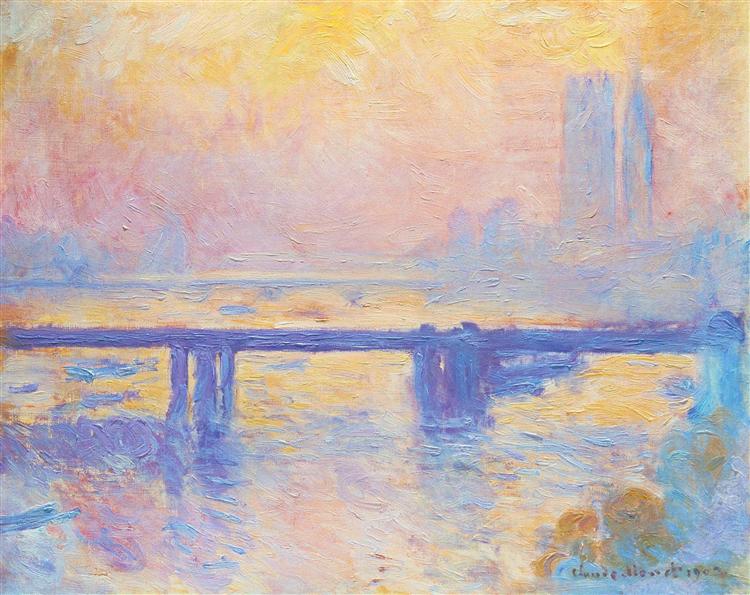Description
The 1903 painting "Charing Cross Bridge", a masterpiece by the celebrated Impressionist Claude Monet, is a splendid testament to his unrivalled ability to capture light and atmosphere in his cityscapes. This work represents a specific moment in the evolution of Impressionism, where Monet does not simply portray a scene, but captures the very essence of the London environment through his characteristic use of colour and loose brushwork.
Charing Cross Bridge, situated over the River Thames, is immediately recognizable in this work. Monet offers us a view that is both descriptive and evocative, achieving a fusion between naturalism and abstraction. The bridge, with its iron architectural structure, serves as a focal point, but it is the luminous treatment of the scene that really draws the viewer's attention. Monet's chosen palette is imbued with subtle nuances: shades of blue and grey dominate the sky and water, while they are contrasted with soft touches of orange and pink that allude to the effect of the setting sun. This chromatic approach succeeds in conveying a changing atmosphere, where each moment seems unique.
Looking closely at the painting, one can appreciate Monet's rapid, gestural brushwork, which is fundamental to the Impressionist style. This technique suggests the immediacy of the experience, as if the viewer could feel the breeze on their skin and the reflection in the water. In addition, Monet incorporates the fog characteristic of London, a device that not only enriches the painting visually, but also adds a poetic dimension to the composition, evoking urban life in an almost ethereal way.
In terms of characters, the work does not focus on individual human figures, but rather on the life that inhabits around the bridge and the movement of the water. This absence of specific characters allows the place itself to come alive and act as a protagonist. However, the presence of boats on the river and some silhouettes in the distance suggest a vibrant activity that intrigues the viewer, inviting them to imagine the stories that take place in this urban landscape.
"Charing Cross Bridge" falls within a period when Monet was exploring the relationship between water and light, as he had done previously in works such as "Impression, Sunrise". As Impressionism evolved, Monet experimented with different times of day and atmospheric conditions, and this work exemplifies his interest in the effect of light on the built environment. The choice of London as a subject reflects not only his admiration for the city, but also his desire to portray modernity in transformation.
This painting is a clear example of Monet's innovative approach and his ability to transform it into art through his technique. In a period where art was moving away from norms and academicism, Monet positioned himself as a pioneer, blurring the lines between representation and experience. Ultimately, Charing Cross Bridge does not simply encapsulate a specific place - it is a testament to Monet's poetic vision, which continues to resonate with contemporary audiences and whose lessons on perception remain impactful today.
KUADROS ©, a famous painting on your wall.
Hand-made oil painting reproductions, with the quality of professional artists and the distinctive seal of KUADROS ©.
Painting reproduction service with satisfaction guarantee. If you are not completely satisfied with the replica of your painting, we will refund 100% of your money.

